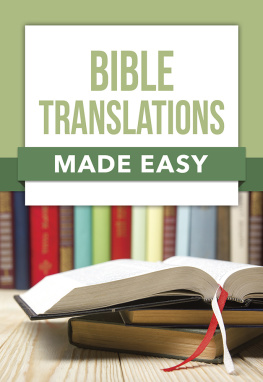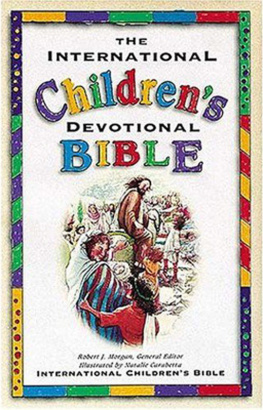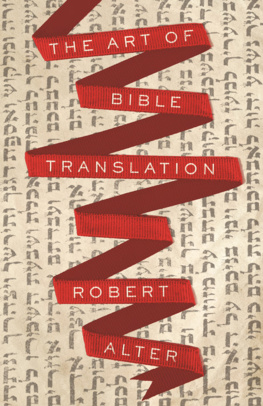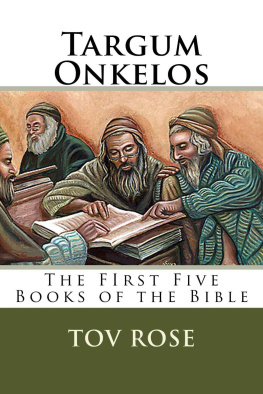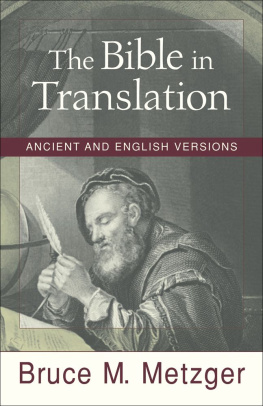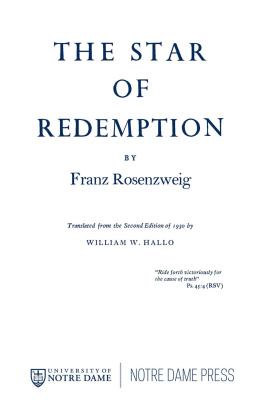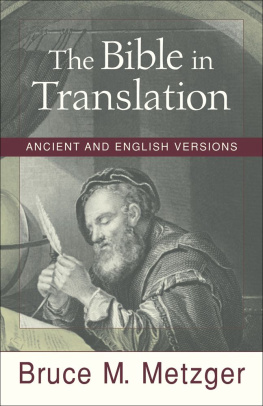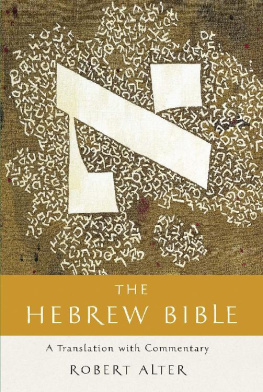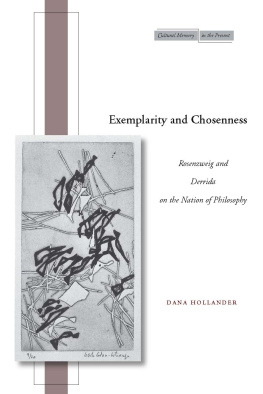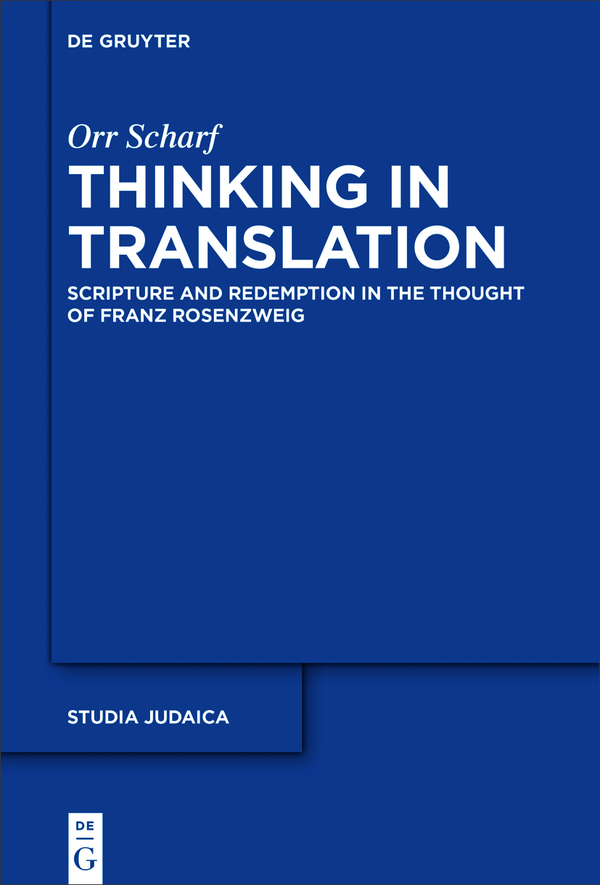Studia Judaica
Forschungen zur Wissenschaft des Judentums
Edited by
Ernst L. Ehrlich
Gnter Stemberger
Charlotte Fonrobert
Elisabeth Hollender
Alexander Samely
Irene Zwiep
Volume
ISBN 9783110475166
e-ISBN (PDF) 9783110476897
e-ISBN (EPUB) 9783110475272
Bibliographic information published by the Deutsche Nationalbibliothek
The Deutsche Nationalbibliothek lists this publication in the Deutsche Nationalbibliografie; detailed bibliographic data are available on the Internet at http://dnb.dnb.de.
2019 Walter de Gruyter GmbH, Berlin/Boston
, ( ', ')
Abbreviations
Arbeitspapiere
Franz Rosenzweig. Der Mensch und sein Werk. Gesammelte Schriften IV: Sprachdenken 2. Band. Arbeitspapiere zur Verdeutschung der Schrift.
Bavli
The Babylonian Talmud
Briefe
Walter Benjamins Briefe III
BT I & II
Franz Rosenzweig. Der Mensch und sein Werk. Gesammelte Schriften I: Briefe und Tagebcher. Band I: 19001918; Band II: 19181929
GS
Walter Benjamins Gesammelte Schriften
Guide
Maimonides, The Guide of The Perplexed (English translation)
Illuminations
Walter Benjamin, Illuminations: Essays and Reflections
Judah Halevy
Franz Rosenzweig. Der Mensch und sein Werk. Gesammelte Schriften IV: Sprachdenken. 1. Band. Jehuda Halevi. Fnfundneunzig Hymnen und Gedichte, Deutsch und Hebrisch mit einem Vorwort und mit Anmerkungen.
Kokhav
The Star of Redemption (Hebrew Translation)
Life and Thought
Nahum Glatzer. Franz Rosenzweig: His Life and Thought.
Moreh
Maimonides. The Guide of the Perplexed (Hebrew)
On Jewish Learning
Franz Rosenzweig, On Jewish Learning
Reflections
Walter Benjamin, Reflections: Essays, Aphorisms, Autobiographical Writings
Tagebcher
Typescripts IIII, 14 December, 1905 4 March, 1908; Typescripts IVV, VII and Notebook, 6 March, 1908 13 September, 1922. Franz Rosenzweig Collection, AR 3001, Series II, Subseries I. Leo Baeck Institute, Center for Jewish History, New York
Scripture and TranslationMartin Buber and Franz Rosenzweig, Scripture and Translation
SE/SR
Stern der Erlsung/Star of Redemption
SW
Friedrich Wilhelm Joseph Schelling, Smmtliche Werke
Theological Writings
Franz Rosenzweig, Philosophical and Theological Writings
Yerushalmi
The Palestinian Talmud
Zweistromland
Franz Rosenzweig. Der Mensch und sein Werk. Gesammelte Schriften III: Zweistromland: Kleinere Schriften zu Glauben und Denken
List of Tables
Tab. 1.1:
Daniel 11:14
Tab. 3.1:
The Guide of the Perplexed in The Star of Redemption
Tab. 4.1:
Isaiah 25:8 in the Star of Redemption
Tab. 4.2:
Jonah 2:34 and the sea of Gods inner physis
Tab. 4.3:
Exodus 3:14
Tab. 4.4:
Numbers 2829 and the Liturgical Calendar in the Star
Tab. 4.5:
mikra kodesh Exodus 12:16
Tab. 5.1:
Biblical Citations in Bubers Star of Redemption
Tab. 5.2:
Jeremiah 10:10
Tab. 5.3:
Maimonides and Rosenzweig on Jeremiah 10:10
Tab. 5.4:
in Translation
Tab. 5.5:
Rosenzweigs Vision of the Temple and Parallels in Hekhalot Literature
Tab. 6.1:
Exodus 19:1
Tab. 6.2:
Exodus 4:15
Tab. 6.3:
Exodus 12:49
Acknowledgments
Thinking in Translation: Scripture and Redemption in Franz Rosenzweig's Thought is also the title of my dissertation, which I completed at the University of Haifa's Department of Philosophy in 2014. Prof. Paul Mendes-Flohr agreed to supervise my dissertation of out the pure kindness of his heart. He not only taught me the craft of scholarship, but what human dignity and genuine care for the other look like in real life. As our meetings grew longer, he insisted on dedicating more and more time to conversations about family, mine and his, and any other topic that was relevant to my personal life at the time. Prof. Daniel Statman had no good reason to become my supervisor either, as modern German-Jewish thought is not exactly a natural complement to the many areas of his research and expertise. But once he agreed, Prof. Statman became an enthusiastic reader of the evolving dissertation and a sage advisor on all matters academia.
Vivian Liska, Professor of Germanistik at The University of Antwerp and Hebrew University has been an unfailing source of support and an incredible source of inspiration. Prof. Nitza Ben-Dov, head of the Cultural Studies M.A. Program at the University of Haifa, my academic home, became my guardian angel. If it was not for her, Thinking in Translation would not have completed the transition from dissertation to book. No words will suffice to express my indebtedness to her encouragement, practical advice, and above all her inexorable Menschlichkeit. Stuart Schoffman, my mentor and dear friend, has been teaching me for many years what Thinking in Translation is and can be. My dear friend Dr. Avital Davidovich Eshed has been a rock-solid source of support and insight.
This book has undergone a long gestation. As a fresh Ph.D, Prof. Guy Miron generously invited me to the Open University of Israel where I spent two wonderful years as a post-doctoral fellow. Since we first met Prof. Ora Limor has been an avid supporter and edifying interlocutor. My stay as Ruth Meltzer Fellow at the Herbert D. Katz Center for Advanced Judaic Studies, Philadelphia in Spring 2017 has been a true eye-opening experience. Center Director Prof. Steven Weitzman proved to be not only a gracious host, but also a wonderful conversation partner on all matters Rosenzweig, generously sharing his expertise in Bible scholarship and general erudition. At the Center I have also greatly benefitted from the friendship and advice of Natalie Dohrmann, Anne Albert and Arthur Kiron, as well as from edifying conversations with Lihi Ben Shitrit, Emily Cooper, Menachem Lorberbaum, Vered Sakal, Claude Dov Stuczynski, Vasileos Syros, Philipp von Wussow, and most of all Lois Dubin, whose insights about life and abiding friendship influenced me even more than her consummate scholarship. My thanks also goes to Bonnie Blankenship, Sam Cardillo, and Elizabeth Martin for their warm welcome and helpfulness.
I am thankful for the reader at De Gruyter for his forthcoming feedback and uncompromising corrections. Prof. Michael Morgan read my dissertation and responded both encouragingly and critically. Prof. Zev Warren Harvey generously agreed to read the chapter on Maimonides and provided invaluable comments and suggestions. Cass Fisher has been a partner-in-crime to the study of Rosenzweig's life and thought. Nassima Sahraoui, Caroline Sauter and Paula Schwebel gave insightful comments and helpful references on Walter Benjamin's work. Albert Baumgarten, Michal Bar-Asher Siegal and Jonathan Ben Dov accepted me to their study group on Jewish Culture in Antiquity. In the realms of ancient history I also owe deep thanks to Tessa Rajak, Martin Goodman and Andrea Schatz of the AHRC Josephus Project at Oxford University. My thanks is due to many other fine scholars: Paul Franks, Antonios Kalatzis, Ron Margolin, David Myers, Hindy Najman, David Ohana, Benjamin Pollock, Ishay Rosen-Zvi, Ada Taggar-Cohen, Claudia Weltz, Christian Wiese and Ynon Wigoda.
At The University of Haifa, I would like to thank Prof. Gur Alroey, Dean of the Faculty of the Humanities for his wonderful responsiveness and encouragement. Cedric Cohen Skalli and Amos Morris-Reich were fantastic testing ground for new ideas and their genuine help for my career is deeply appreciated. Riki Snir-Zusman, the Cutural Studies Program's indefatigable coordinator has contributed enormously to the final stages of the book's preparation with advice and encouragement.


